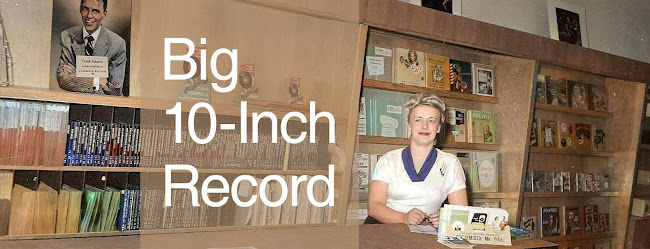My friend Lee, proprietor of the MYPWHAE blog (click here for
full title), specializes in reviving the lower depths of the record market, 1950s
budget labels purveying cheap cover versions of the popular hits of the time.
His most recent collection is a good example – for example,
you get “Mambo Italiano” and “Come on-a My House,” not by Rosie Clooney but Mimi
Martel and Elliott Everett and His Orchestra instead. These are among the 15
songs in this particular collection.
The records are great fun, veering between awful and surprisingly
good. Lee always wrings excellent sound from the grooves of these battered relics.
I recently mentioned to Lee that I have a large number of
German language cover records from the 50s and 60s. He expressed interest, so I
prepared an example of such a collection for him and of course for you, dear reader.
The record is called Das grosse Starparade (Parade of Great Stars,
as you probably figured). It was a product of the venerable German label Polydor, a
pop music imprint at the time. Polydor put out these collections from time to
time; this is the sixth in the series. It dates from 1959, incorporating songs from 1958 and 59.
To be clear, Das grosse Starparade compiled all types of German
pop singles, only some of which were covers of American hits. Of the latter, included
here are covers of “To Know Him Is to Love Him,” “Blue Hawaii,” “Purple People
Eater,” “Tom Dooley,” “Promise Me, Love” and “Haiti Cherie,” along with remakes
of Brazilian and Australian songs.
I imagine readers of this blog will find most of the artists
involved to be unfamiliar, so here are some comments about them and some of their songs.
Freddy Quinn (usually billed as just Freddy) was a hugely
popular singer and film star. He was often cast as a wandering sailor – thus his
characteristic hit song, “Die Guitarre und das Meer,” from the film of the same
name. I enjoy Freddy and have many of his records.
Melitta Berg had her only big success as a hit singer with “Nur
du, du, du allein,” a cover of the Teddy Bears’ “To Know Him Is to Love Him.”
Bob und Eddy were Wolfgang Roloff (aka Bob Hill) and
Wolfgang Börner (aka Eddy Börner). To make it even more confusing, Roloff later
had a number of hits under the name Ronny. Bob und Eddy have two songs in this group.
Alexander (later Rex) Gildo was a German ballad singer who
sold many millions of records and starred in film and television. He was dubbed
the “German Cliff Richard.”
The Teddies, founded by Werner Cyprys in 1957, recorded a
total of 17 singles for Polydor.
Ted Herold was a German singer who also appeared in several
films in the 1960s. “Hula Rock,” a paean to the hula hoop, was originally by
the Australian LeGarde Twins. (It is not the Hank Snow tune.)
Kurt Edelhagen led a popular big band and was music director
for two large German radio stations. “Blue Hawaii”
was not inspired by the Elvis movie, which didn't come out until 1961. This rendition was a cover of
a Billy Vaughn instrumental from 1958. Edelhagen’s arrangement parrots
Vaughn's dual-alto sound.
Caterina Valente is a French-born Italian singer, guitarist, dancer, and actress. She is well known in the US,
spending part of her career here. Valente was a singer in Edelhagen’s band
early in her career. “Haiti Cherie” is a traditional song; Valente's single was probably
inspired by Harry Belafonte’s version, issued as a 45 and on his 1957
Songs of the Caribbean LP.
The elaborately named “Wumba-Tumba Schokoladeneisverkäufer”
is Sheb Wooley’s “Purple People Eater” in disguise. For the German market, the
people eater has been transformed into, as far as I can tell, a flying chocolate
ice cream vendor. Bill Ramsey, an American, came to Germany
as an airman, and stayed. He preferred jazz, but made his name with the likes
of the “Wumba-Tumba” song.
Information is scant on Das Tom-Dooley Trio. It apparently included
Bernd Golonsky, later a member of the Günter Kallmann Chorus.
“Stern von Montana” (Star of Montana) is by the Das Blauen
Jungs (The Blue Boys), an Austrian vocal quartet helmed by Polydor's star composer
Werner Scharfenberger.
“Fern (Far Away) in Java” was a cover of “Promise Me, Love,”
a 1958 single written for Andy Williams by his mentor, Kay Thompson. It is one
of a number of Polydor singles by the Stefano Twins.
"Ave Maria no Morro," composed by the Brazilian
Herivelto Martins, dates back to 1942. Helmut Zacharias was a hugely popular
violinist and bandleader who led his Verzauberten Geigen (Enchanted Violins) on many records.
A few years after Das grosse Starparade was issued, a number of German
artists and songs became popular in the US. First was Lolita’s 1961 hit “Seemann…”, written by Werner Scharfenberger, with
its overdubbed English narration. That was followed quickly by Bert Kaempfert’s
“Wonderland by Night” and “Calcutta,” the latter in a version by Lawrence Welk.
(Kaempfert provides the orchestral support on the Ted Herold and Freddy songs
above.)
Finally, Elvis sang an adaptation of the German folk song
“Muss i denn” in his movie G.I. Blues, which became a hit in Europe
under the title “Wooden Heart.” Elvis’ rendition was never issued stateside, but Joe Dowell had a hit here with a cover version.
The download has many more artist photos and label pics. I enjoy listening to these German compilations – I must, I have about 20 of them. Hope you will like this one as well.









